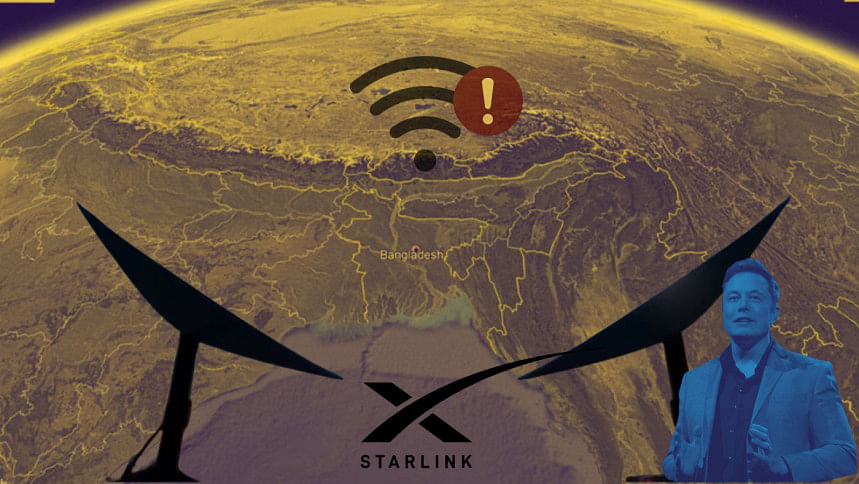Freedom in the sky?: The limits of satellite internet in Bangladesh

When the Bangladesh government pulled the plug on the internet during the student-led mass uprising in July-August 2024, millions were plunged into digital darkness. Messaging apps went silent, live streams were cut mid-broadcast, and access to real-time information vanished overnight. In the chaos, one question echoed across social media: if we can't count on the ground networks, what's left?
Enter Starlink. The satellite internet service, backed by Elon Musk's SpaceX, has been touted by Bangladeshi officials as a futuristic fix to prevent such blackouts. With internet signals beamed directly from orbit, the idea of a censorship-proof, disruption-resistant network has captured public imagination. But amid the enthusiasm lies a host of unanswered questions: can satellite internet safeguard freedom of expression and access to information? Can it truly enhance resilience against politically motivated disruptions? What are the implications for regulatory oversight, data governance, and national sovereignty?
At first glance, satellite internet, particularly low-Earth orbit systems like Starlink, appears to offer a safeguard against the kind of top-down control of the internet we have witnessed in Bangladesh. The internet shutdown in July last year was not just a technical blackout. It was a political decision to sever communication, silence dissent, and control the flow of information.
And so, it's tempting to frame satellite internet as a kind of digital lifeboat. After all, it bypasses terrestrial infrastructure—fibre optic cables, telecom towers, ISP backbones—all of which governments can seize, throttle, or shut off. In theory, satellite internet makes it harder for a single actor to flip the switch on dissent. That's the promise anyway.
Starlink satellites can be remotely controlled by authorities—turned off and disabled, confined to a specific area known as geofencing, or redirected and re-routed through alternative networks—often without users' and government knowledge or consent. This makes them powerful tools for enforcing shutdowns or surveillance because the entire infrastructure stack is under the jurisdiction of US law and subject to US foreign policy.
But I want to challenge us to interrogate the promise more deeply, because satellite internet does not operate in a vacuum. It is embedded within global systems of capital, geopolitical influence and technical realities. And while it may sidestep one form of control, it may simultaneously introduce new ones—less visible, but equally consequential.
The political economy of shutdowns
We often talk about shutdowns as censorship, but they are also about control over economic flows. In Bangladesh, the shutdown in 2024 didn't just silence protesters; it disrupted livelihoods. So, it's not surprising that the interim government, immediately after the unrest, accelerated negotiations with Starlink, not as a human rights measure but as an economic stabiliser.
Here, satellite internet becomes a risk management tool for the state, meant to uphold investor confidence and guarantee continuity in economic activities. And while this may inadvertently safeguard freedom of expression, it is not necessarily motivated by democratic principles. If we are not careful, we risk celebrating resilience that is rooted in market logic, not human rights.
Who really controls the skies?
Let's talk about who really has access and control in the context of satellite internet. Starlink is not just a communications service, it is a US-based private enterprise, deeply entwined with the American industrial-defence ecosystem. Starlink satellites can be remotely controlled by authorities—turned off and disabled, confined to a specific area known as geofencing, or redirected and re-routed through alternative networks—often without users' and government knowledge or consent. This makes them powerful tools for enforcing shutdowns or surveillance because the entire infrastructure stack is under the jurisdiction of US law and subject to US foreign policy.
From a technical standpoint, this means Bangladesh does not own or control the infrastructure through which its citizens' data travels. When someone uses satellite internet, their data doesn't go directly to local internet infrastructure. Instead, it is sent (uplinked) from the user terminal to a satellite in orbit. From there, the satellite beams the data down to ground stations, which may be in foreign countries and operated by private companies. Only then does the data enter the broader internet, often bypassing national infrastructure and regulatory oversight.
In India, for example, the government forced Starlink to stop accepting pre-orders until it secured a licence. Why? Because encrypted satellite communication could bypass state monitoring systems, especially in politically sensitive regions like Kashmir.
This dependency raises questions about regulatory jurisdiction and accountability. Satellite internet operates across borders, complicating national oversight and creating potential vulnerabilities to surveillance, data privacy violations, or political pressure from external governments. And yet, Bangladesh, despite having far less regulatory capacity, has moved ahead without a coherent or enforceable strategy. Regulatory bodies like the Bangladesh Telecommunication Regulatory Commission (BTRC) are structured to manage traditional spectrum licensing for mobile networks, not to oversee or audit foreign-operated satellite systems that bypass national infrastructure and beam internet directly into remote communities without relying on local intermediaries.
The result is a jurisdictional void. Starlink becomes not just a workaround to terrestrial censorship, but a relocation of power: from state regulators to corporate policy departments, from national laws to foreign boardrooms. What we call "resilience" may, in fact, be disempowerment—trading one form of control for another.
The illusion of universality
Let's also examine the technical accessibility of satellite internet. In theory, satellite internet should be a great equaliser, offering rural communities and marginalised populations the same digital opportunities as those in urban centres.
But in practice, it is prohibitively expensive. In Kenya, the service is subsidised to $10 a month. In Zambia and Rwanda, it's around $30. According to the latest figures, Starlink offers two residential internet packages in Bangladesh, Residential Lite at Tk 4,200 per month (approximately $35) and Residential at Tk 6,000 per month (approximately $50), with one-time hardware and setup cost of Tk 47,000 (roughly $402), while the average monthly salary in the country is around Tk 26,000 (about $245). That means the upfront cost of the hardware alone is nearly 1.8 times the average monthly income, and the recurring monthly subscription could consume 15-23 percent of a typical worker's wages.
Technically speaking, the Starlink hardware—a phased-array antenna called "Dishy McFlatface"—is highly advanced. But it's also fragile, requires a clear line of sight to the sky, and draws around 100 watts of power continuously. That's more than what many households can afford to power reliably during outages.
Can satellite internet safeguard freedom of expression and access to information? Yes, it might be possible. But only if we govern it well. Without robust legal frameworks, democratic accountability, and inclusive policy design, we risk replacing one form of centralised control with another—this time, embedded within opaque corporate structures and complex transnational dependencies.
So, who will use it? Not the student live-streaming a protest. Not the rural health worker trying to send data during a crisis. Likely, it will be gated to those with existing access to reliable infrastructure and institutional support—urban elites, corporate entities. In this way, satellite internet risks reinforcing a two-tiered system, one where meaningful connectivity remains out of reach for those who need it most.
Internet shutdowns are not just technical problems
The central policy challenge is that we treat internet shutdowns as technical disruptions that require technical fixes. But the reality is, internet shutdowns are acts of state power—deliberate, political decisions aimed at information control. They are not engineering failures; they are governance failures. And yet, we often respond with technical solutions. We reach for circumvention tools, virtual private networks (VPNs), mesh networks, and now satellite internet. These tools can be powerful stopgaps. They can mitigate harm. They can allow human rights defenders to continue documenting abuse, enable journalists to publish when the fibre lines are cut, and preserve life-saving communication during repression or conflict.
But the danger is, if we invest in satellite internet without also reforming the political culture, the legal and institutional frameworks that permit shutdowns in the first place, we will have treated the symptom, not the disease. We risk accepting the false notion that resilience means finding workarounds rather than addressing the root problem: that internet shutdowns should not happen in the first place.
So, can satellite internet safeguard freedom of expression and access to information?
Yes, it might be possible. But only if we govern it well. Without robust legal frameworks, democratic accountability, and inclusive policy design, we risk replacing one form of centralised control with another—this time, embedded within opaque corporate structures and complex transnational dependencies.
The satellites may orbit above us. But the consequences of how we govern them will be felt here, on the ground, by the people.
Dinah van der Geest is a researcher on digital rights and internet governance.
Views expressed in this article are the author's own.
Follow The Daily Star Opinion on Facebook for the latest opinions, commentaries and analyses by experts and professionals. To contribute your article or letter to The Daily Star Opinion, see our guidelines for submission.

 For all latest news, follow The Daily Star's Google News channel.
For all latest news, follow The Daily Star's Google News channel. 






Comments